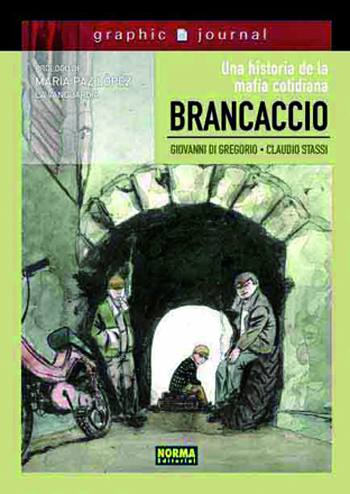
The neighborhood of Brancaccio is located in the east of Palermo, at the back of the train station. It is similar to other parts of Sicily, with dark streets and obsolete buildings. The narrative aspect of the street corners in the eyes of an outsider who is not looking for a pompous postcard can have a special charm, but the fumetto that we have in our hands (what a beautiful name to name the comic!) It shows us that behind this dirty photo there is an even darker reality. Although the most violent years have passed, La Cosa Nostra still secretly controls Brancaccio, its businesses and the movement of its citizens, outside of this often epic image of the mafia that Hollywood has spread.
The two Palermo authors, the screenwriter Giovanni di Gregorio and the illustrator Claudio Stassi, have managed to reflect this pressure without using too many ornaments; the presence of the mafia is suffocating in the daily life of Brancaccio. It's confidential, there's no shooting, no blood, but the locals feel his breath in the neck.
Norma launches the novel Brancaccio as part of the Graphic journal collection, which aims to combine graphic novels and whistle-blower journalism. The books in the collection include articles by journalists and friends related to the subject. María Paz López, correspondent of La Vangurdia in Rome, is one of the participants in the Spanish edition of Brancaccio. In the preface it says that perhaps a person who does not live in beautiful Sicily will not capture all the nuances of the comic. This is likely to happen. However, this deficiency is covered by the periodistic texts: The reflections and explanations of Rita Borsellino (sister of the magistrate Paolo murdered by the mafia), the Italian journalist Saverio Lodato, members of the Adiopizzo movement against the pizza –the tax demanded by the mafia– and the duo Di Gregorio Stassi will help us better understand the story that the comic tells.
My mother always says: “I never understood why World War I happened. It doesn't make any sense to him. He does not understand why the old European powers were involved in such barbarism and does not get into his head how they were persuaded to kill these young men from Europe,... [+]
"Ask for your turn and we'll join you," the willing and cheerful announcer who speaks from the studios tells the young correspondent who walks through the streets of Bilbao. The presenter immediately addressed the audience. "In the meantime, we are going to Pamplona..." They opened... [+]
At the beginning of the year, the Zedarria group publicly supported the "opening of the debate" on the "defense" industry (as well as the nuclear industry), to which the Basque Government has immediately joined. First, through Mikel Torres, Vice President and Economic Counselor, who... [+]